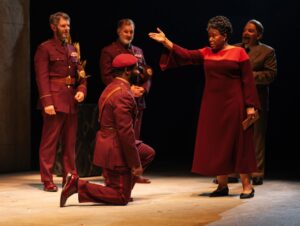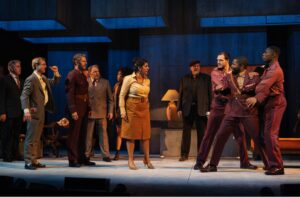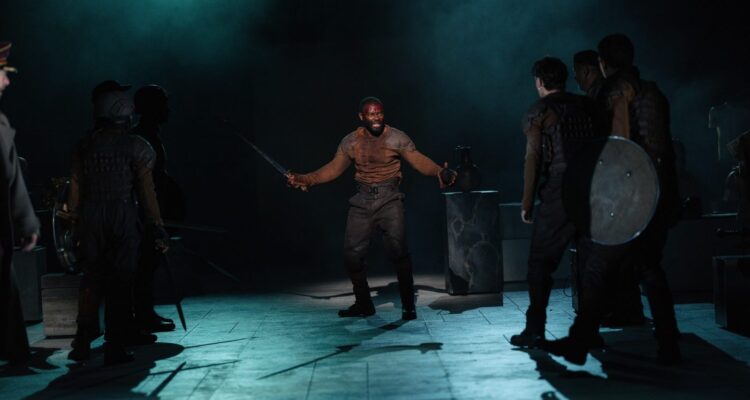Coriolanus, one of Shakespeare’s lesser-known tragedies, delves into themes of political power, rebellion, and personal pride. The play was banned in Nazi Germany, the Soviet Union, and France in the 1930s. Historically, it serves as a potent reminder of the dangers of defiance and critiques of authority, as well as how easily sections of society can be manipulated and driven to violence.
Lyndsey Turner’s new production at the National Theatre opens with a powerful visual metaphor for the conflict between the ruling class and the common people. The plebeians demand more political power, while Coriolanus, embodying the elite, is presented in a suit, bowtie, and holding a glass of champagne, symbolising his belief in strong, centralised authority. This visual imagery sets the stage for the unfolding drama.
At the heart of the production is David Oyelowo’s portrayal of Caius Martius, later named Coriolanus after his victory over the Volscians. Oyelowo brings a commanding presence to the role, capturing both Coriolanus’s military prowess and his internal political conflicts with precision. His nuanced performance balances the indomitable soldier and the deeply flawed man whose disdain for the public leads to his downfall. While Oyelowo’s physicality and delivery are striking, the production suffers from a lack of emotional depth in key relationships—especially between Coriolanus and the two central women in his life: his mother, Volumnia, and his wife, Virgilia.
Kemi-Bo Jacobs’ portrayal of Virgilia, unfortunately, lacks the emotional intensity the role requires. Virgilia, a character meant to embody quiet strength and deep concern for her husband’s fate, comes across as distant and uninspired. This disconnect prevents the audience from feeling the tension and anxiety that should define her relationship with Coriolanus, leaving certain emotional moments to fall flat.
Pamela Nomvete, as Volumnia, offers a stronger performance but still falls short of expectations. Volumnia, as Coriolanus’s domineering mother, plays a pivotal role in shaping her son’s fate, and her final plea for him to spare Rome should be a deeply moving moment. Although Nomvete delivers her lines with technical skill, her portrayal lacks the raw emotional power necessary to fully capture the depth of their relationship, leaving Oyelowo to carry the weight of their interactions. This undermines the tension that should build as Coriolanus struggles with his choices.

Kobna Holdbrook-Smith’s portrayal of Aufidius, Coriolanus’s rival, is uneven. While he brings intensity to the battle scenes, the antagonistic energy between Coriolanus and Aufidius never fully ignites, diminishing the dramatic tension that should exist between these two powerful figures.
On a more positive note, the political maneuvering to turn the plebeians against Coriolanus is effectively portrayed by tribunes Stephanie Street’s Sicinius and Jordan Metcalfe’s Brutus. Their performances as manipulative politicians willing to do anything to serve their aims are convincing and relatable, adding a crucial layer to the narrative.

Visually, the production excels in its technical elements. Tim Lutkin’s lighting design is exceptional, creating striking contrasts that heighten the overall atmosphere. Es Devlin’s imaginative stage design uses minimalist elements effectively, ensuring that the drama remains the focal point. The use of video and black-and-white imagery was also notable, evoking a sense of politicians’ detachment from the public and highlighting themes of modern political manipulation through media. However, while these elements attempt to broaden the political scope of the play, the raw visceral force that defines Coriolanus is often obscured by layers of mixed periods and thematic choices.
This visual inconsistency ties neatly into the costume design, which lacks a clear sense of period. The leading characters are dressed in late 1960s attire, while the women who approach Coriolanus are clad in a strange blend of Greek and Roman-inspired costumes. Although the themes in Coriolanus are timeless, this mishmash of costume styles feels superficial and adds little to the production, potentially confusing new audiences. In the end, while this Coriolanus dazzles visually in parts, it falters emotionally. The production’s lack of emotional depth diminishes the narrative’s driving force, leaving the audience yearning for a more compelling connection.
Director: Lyndsey Turner
Set Designer: Es Devlin
Costume Designer : Annemarie Woods
Lighting Designer: Tim Lutkin
Sound Designer: Tom Gibbons
Composer: Angus MacRae
Video Designer: Ash J Woodward
Cast includes David Oyelowo, Kobna Holdbrook-Smith, Stephanie Street and Jordan Metcalfe, Patrick Elue, Kemi-Bo Jacobs, Sam Hazeldine, Jo Stone-Fewings, Pamela Nomvete and Peter Forbes.
Photo by Misan Harriman.

